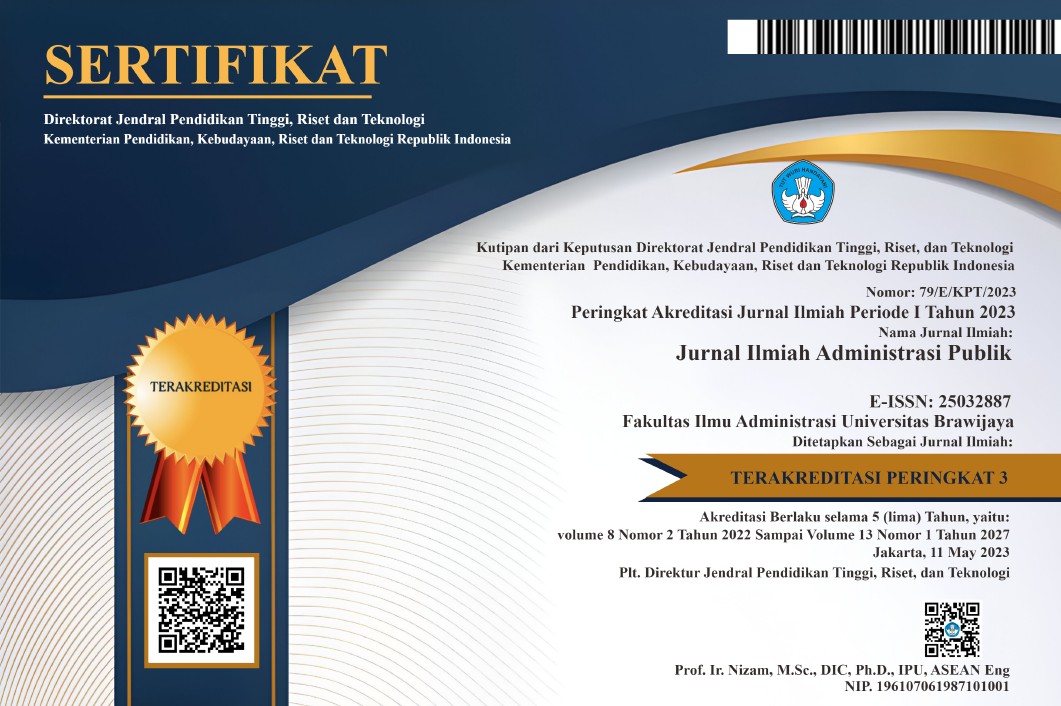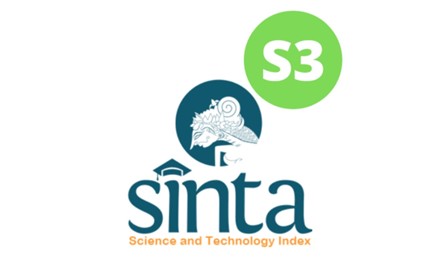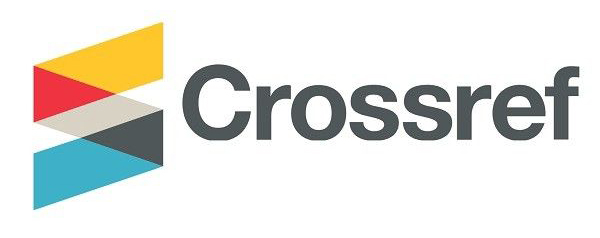Implementasi Kebijakan Pengembangan Ekowisata dalam Meningkatkan Perekonomian Daerah
(Studi pada Destinasi Wisata Gombengsari Kabupaten Banyuwangi)
DOI:
https://doi.org/10.21776/ub.jiap/2023.009.02.1Keywords:
implementation;development; ecotourism-based; GombengsariAbstract
This study focuses on 3 main aspects of the implementation of ecotourism development policies in Gombengsari Village, Banyuwangi Regency. This research limits the implementation study before the Covid 19 pandemic. From the theoretical aspect, this study uses Edward III's theory as the main reference theory and ecotourism theory. This research uses qualitative-descriptive research methods. Primary data sources are interview results and secondary data sources are documents. data analysis techniques using Miles and Huberman data analysis. The results obtained show that there are several obstacles such as the absence of monitoring and evaluation of training programs by Dinas Kebudayaan dan Pariwisata of Banyuwangi Regency and low operational budgets in regional tourism development. But in general, the implementation that occurs is good, manifested in the form of tourism development in both tourist destinations and tourism support industries.
References
Agiomirgianakis, G., Serenis, D., & Tsounis, N. (2017). Effective timing of tourism policy: The Case of Singapore. Elsavier, Economic Modelling, 60, 29-38. https://doi.org/10.1016/j.econmod.2016.09.001
Alikulova, A. (2014). Tourism Impact on Improvement of Population Welfare in Kazakhstan. Actual Problems of Economics Journal, 155, 190-200.
Andriyani, I., Husnita, L., & Hardi, E. (2012). Perubahan Sosial Ekonomi Masyarakat Pasca Pengembangan Wisata Bahari di Kepulauan Sikakap, Kabupaten Mentawai. Jurnal Ilmu Sosial Mamangan, 1(2), 95-101. https://doi.org/10.22202/mamangan.v1i2.1355
Bulin, D. (2015). Policies and Strategies for tourism development – Some Lessons for Romania. Faculty of Finance, Banking and Accountancy Bucharest Journal, 7(2), 77-81.
Dalonso, Y. S., Lourenço, J. M., Remoaldo, P. C., & Netto, A. P. (2014). Tourism Experience, Events and Public Policies. Annals of Tourism, 46(2), 181-184.
Hwang, J. H., & Lee, S. (2014). The effect of the rural tourism policy on non-farm income in South Korea. Tourism Management, Elsevier, 46, 501-513.https://doi.org/10.1016/j.tourman.2014.07.018
Edward III, G. C. (1980). Implementing Public Policy. Congressional Quarterly Press.
Lasaiba, M. A. (2022). Pengembangan Ekowisata Berbasis Masyarakat: Sebuah Studi Literatur. Jurnal Jendela Pengetahuan, 15(2), 1-7.
Miles, M. B., Huberman, A., & Saldana, J. (2014). Qualitative Data Analysis, A Methods Sourcebook, 3rd Edition. Sage Publications, Inc.
Murianto & Masyhudi, L. (2021). Identifikasi Potensi Pengembagan Ekowisata Desa Karang Sidemen Untuk Mendukung Berkelanjutan di Lingkar Geopark, Lombok Tengah. Jurnal Ilmiah Hos-pitality, 10(1), 79-86.
Oktaviliai, S. (2011). Pengembangan Potensi Ekonomi Lokal Daerah Tertinggal sebagai Upaya Mengatasi Dinas Pariwisata dan Kebudayaanitas Pendapatan Antar Daerah di Provinsi Jawa Tengah. Jurnal Prosiding SNaPP, 2(1), 219-228.
Putri, E. D., Yulianto, A., Wardani, D. M., & Saputro, L. E. (2022). Dampak Ekonomi, Sosial dan Lingkungan Terhadap Ekowisata Berbasis Masyarakat. Jurnal Ilmiah Pariwisata, 27(3), 317-327. https://doi.org/10.30647/jip.v27i3.1632
Sari, A. P., Agus, I. P., Mahendra, A., Wade, Y. R., & Nasional, U. P. (2021). Strategi Penghijauan Desa Sesandan Menuju Desa Ekowisata. PARTA: Jurnal Pengabdian Kepada Masyarakat, 2(2), 110–113. https://doi.org/10.38043/parta.v2i2.3352
Utama, M. S. (2016). Pengaruh perkembangan Pariwisata Terhadap Kinerja Perekonomian dan Perubahan Struktur Ekonomi Serta Kesejahteraan Masyarakat di Provinsi Bali. PhD Tesis. Universitas Airlangga.
Downloads
Published
Issue
Section
Categories
License
Copyright (c) 2023 Jurnal Ilmiah Administrasi Publik

This work is licensed under a Creative Commons Attribution-NonCommercial 4.0 International License.
If your paper is accepted, the author identified as the formal corresponding author for the paper will receive an email prompting them to login into Author Services; where via the JIAP Author Licensing Service they will be able to complete the license agreement on behalf of all authors on the paper.















